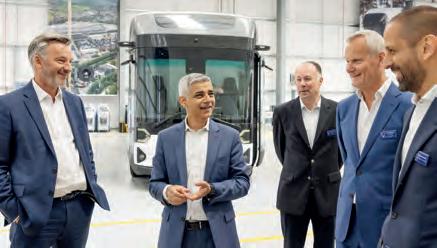
2 minute read
Volta Trucks’ Service Hub in London officially opens
Volta Trucks, the leading and disruptive all-electric commercial vehicle manufacturer and services provider, has officially opened its Truck as Service Hub in Tottenham, London.
The Truck as a Service Hub was officially opened by the Mayor of London, Sadiq Khan, Tottenham MP David Lammy, alongside policymakers, industry leaders and key customers and stakeholders.
Located on White Hart Lane in Tottenham, North London, the cutting-edge facility is the first to open in the UK and is designed to be the main destination for routine servicing and maintenance of vehicles in the London area. The innovative Hub will provide everything a fleet operator needs to support their seamless transition to electric trucks, also hosting admin offices, a Volta Trucks Academy Training centre and a customer call centre that will provide 24/7 assistance and technical support.
Together with Engineering, Software and Development facilities in the Midlands, and the company’s Readingbased commercial operations, the opening of the London Hub brings Volta Trucks’ own UK organisation to over 600 highly skilled employees.
The Mayor expressed his support for Volta Trucks’ pioneering activity, praising the company for its commitment to sustainability and accelerating the industry’s transition towards electrification.
Essa Al-Saleh, Chief Executive Officer of Volta Trucks, added: “We are incredibly grateful to Mayor Sadiq Khan and Tottenham MP David Lammy for opening our brand-new facility. London has always been one of our key install and maintain a network of thousands of EV charging points over the next five years using locally-based teams and expertise.”

Lukasz Michalak, Investment Director, Sustainable Infrastructure, at Octopus, said: “OSIF is focused on investing growth capital into sustainable infrastructure businesses tackling climate change and supporting levelling-up ambitions across the UK. Weev is the perfect example of the next generation of infrastructure companies doing just that. By backing Weev, we see a great opportunity to deliver a positive impact to Northern Ireland’s communities while meeting the financial objectives of the fund.” “We have great confidence in the Weev team. Not only have they previously been in charge of various successful infrastructure businesses in Northern Ireland, but they also share our ethos of putting the customer first.”
John Flint, CEO, UK Infrastructure Bank, said: “We invested in the Octopus Sustainable Investment Fund with the purpose of increasing capital for the next generation of sustainable infrastructure projects across the UK. The potential Weev has to scale up EV charging in Northern Ireland is significant, and we look forward to seeing the impact on decarbonising the local transport infrastructure to support the UK’s transition to net zero.” entry markets throughout Europe. The importance of improving air quality and increasing road user safety here is paramount and why Volta Trucks has made this significant investment. On our mission towards decarbonising urban logistics, we need political support through financial incentives, regulatory certainty and measures to accelerate the installation of charging infrastructure.”
Casper Norden, Chief Fleet Solutions Officer of Volta Trucks, added: “The opening of our Truck as a Service Hub in Tottenham is an exciting milestone for Volta Trucks towards our vision of zero-tailpipe emission cities. By establishing a strong presence in London and other major European cities, we aim to revolutionise the way that goods are delivered and transported in cities, accelerating the adoption of electric commercial vehicles, and paving the way for a cleaner and greener future.”
Complementing the London Hub is a network of thirdparty Certified Service Partners. Sapphire Vehicle Solutions, the company’s first UK partner, has a comprehensive service and maintenance network across the UK, designed around Volta Trucks customers’ requirements. They also use a fleet of mobile servicing units linked to each location, to maximise the uptime of customers’ vehicles.







